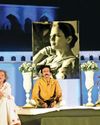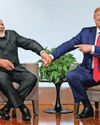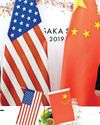Children of martyred soldiers want to serve the nation in whatever way they can. Their fathers’ deaths, they say, shouldn’t have been in vain

Neha Dwivedi, 31, has an unfading childhood memory. Whenever her parents fought, her father would play a Bollywood song about a couple fighting. Although he knew nothing about dancing, he would twirl around goofily, trying to make her mother smile. Her mother would still be moping, and Neha would think to herself: How can she resist his charm? When Neha was 12 years old Major C.B. Dwivedi was martyred in the Kargil War. She would never see him dancing again.
It was July 2, 1999, and Neha was feeling on top of the world. She was at her uncle’s house in Delhi and had just returned after having had icecream with all her cousins. She heard whimpers from a room and went to investigate. All the elders were huddled around her mother, who was sitting in a low chair, her head held in her hands, hair spread all about. Then she knew that something was terribly wrong. She went around shaking everybody and shouting: “Tell me, tell me: why is mummy crying?” She knew her daddy was out at war and she thought to herself: I know it is bad news, but please God, don’t let it be the worst. Then her eldest cousin hugged her and said: “Beta, your father has got martyred.” The first thought that crossed Neha’s mind was: “Oh no, now who is going to teach me maths?”
For it had always been her father who had taken care of her studies. “After his death, every time I sat down to study, I would miss him because the only way I knew to study was with him,” she says. She never used to get worried about her exams because she used to think it was his headache. If she did well, then good for him. If not, he needed to up his game.
Denne historien er fra August 19, 2018-utgaven av THE WEEK.
Start din 7-dagers gratis prøveperiode på Magzter GOLD for å få tilgang til tusenvis av utvalgte premiumhistorier og 9000+ magasiner og aviser.
Allerede abonnent ? Logg på
Denne historien er fra August 19, 2018-utgaven av THE WEEK.
Start din 7-dagers gratis prøveperiode på Magzter GOLD for å få tilgang til tusenvis av utvalgte premiumhistorier og 9000+ magasiner og aviser.
Allerede abonnent? Logg på

The female act
The 19th edition of the Qadir Ali Baig Theatre Festival was of the women and by the women

A SHOT OF ARCHER
An excerpt from the prologue of An Eye for an Eye

MASTER OF MAKE-BELIEVE
50 years. after his first book, Jeffrey*Archer refuses to put down his'felt-tip Pilot pen

Smart and sassy Passi
Pop culture works according to its own unpredictable, crazy logic. An unlikely, overnight celebrity has become the talk of India. Everyone, especially on social media, is discussing, dissing, hissing and mimicking just one person—Shalini Passi.

Energy transition and AI are reshaping shipping
PORTS AND ALLIED infrastructure development are at the heart of India's ambitions to become a maritime heavyweight.

MADE FOR EACH OTHER
Trump’s preferred transactional approach to foreign policy meshes well with Modi’s bent towards strategic autonomy

DOOM AND GLOOM
Democrats’ message came across as vague, preachy and hopelessly removed from reality. And voters believed Trump’s depiction of illegal immigrants as a source of their economic woes

WOES TO WOWS
The fundamental reason behind Trump’s success was his ability to convert average Americans’ feelings of grievance into votes for him

POWER HOUSE
Trump International Hotel was the only place outside the White House where Trump ever dined during his four years as president

DON 2.0
Trump returns to presidency stronger than before, but just as unpredictable